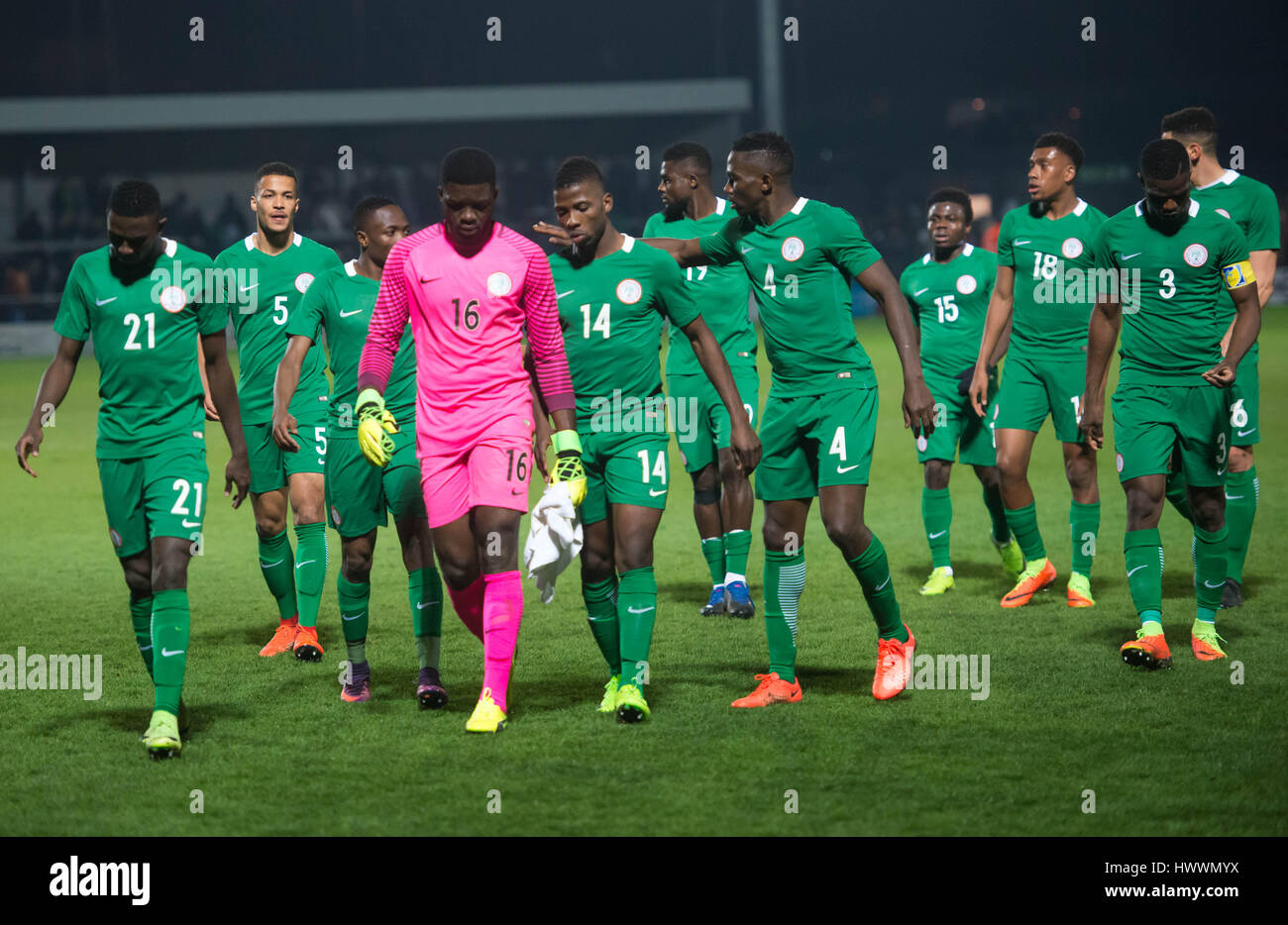Who Introduced Football In Nigeria? The Origins Of Football Within Nig…
페이지 정보
작성자 Arlie 작성일24-12-31 20:10 조회127회 댓글0건관련링크
본문
A whopping 67% of Nigerians see Football, which shows how much the sport influences Nigerian culture. Football's journey in Nigeria began over 100 years dates back to the early, forming the nation's sporting landscape.
Football in Nigeria go back to the early 1900s. British colonisers brought the sport to the nation in 1904. The very first recorded football match took place that very same year, beginning Nigeria's abundant footballing history.

By 1950, Football had actually become Nigeria's national game. Its fast increase caused numerous clubs and associations forming in the early 1900s. This development boosted Nigerian pride and helped influence political liberty motions.
Nigeria's football legacy now reaches beyond its borders. For many years, the nation has actually produced world-class talent, and Nigerian youth groups have actually won the FIFA U-17 World Cup five times.
The Super Eagles, Nigeria's national team, are a force in African Football. They typically qualify for substantial tournaments and make their mark internationally.
The British Colonial Introduction of Football to Nigeria
Football showed up in Nigeria during the British colonial era. It quickly captured the hearts of residents, marking the start of an abundant footballing tradition in the country.
The First Football Match in 1904
The first football match in Nigeria took place in June 1904. It was in between Hope Waddell Training Institution and the team of HMS Thistle. The nigerian youths team won 3-2, stimulating an across the country enthusiasm for the sport.
Hope Waddell Training Institution vs HMS Thistle
I hope the Waddell Training Institution in Calabar played a key role in early Nigerian Football. Their success over HMS Thistle's team revealed the skill of Nigerian gamers. This match set the stage for Football's growth in the country.
Early Football Club Formation (1906-1932)
After the 1904 match, Football's appeal soared. From 1906 onwards, early football clubs began forming, and this grassroots movement spread out the sport throughout Nigeria.
The Lagos District Amateur Football Association (LDAFA) was developed in 1932. The LDAFA marked the start of organised Football in Nigeria and led the way for the sport's future success nationally and worldwide.
Who Introduced Football in Nigeria
Football showed up in Nigeria in the early 20th century. British colonisers brought this precious sport to the West African country. It rapidly became a passion that formed Nigeria's sporting landscape for generations.
Role of British Colonisers
British colonisers played an important role in Nigeria's football history. The first recorded match took place in June 1904. Hope Waddell Training Institution dealt with the crew of HMS Thistle.
The Nigerian group won 3-2. This victory marked the start of an abundant football tradition in the nation.
Development of First Football Association
The Lagos District Amateur Football Association (LDAFA) was established in 1932. It prepared for organised Football in Nigeria, which led the way for the Nigerian Football Association (NFA).
The NFA was founded in 1945. It became the national governing body for Football and oversaw its development throughout the country.

Advancement of Local Football Culture
Football quickly settled in Nigeria, becoming the national sport by 1946. Its ease of access and simple guidelines assisted it spread out quickly. Regional communities embraced the game, forming their teams.
This grassroots interest laid the foundation for Nigeria's future success. The nation's enthusiasm for Football grew, resulting in accomplishments on the worldwide phase.
"Football became more than just a sport; it progressed into an essential Nigerian culture and identity element."
The British colonisers' intro of Football stimulated a sporting revolution in Nigeria. Football's journey mirrored the nation's development from the very first match in 1904 to the development of the NFA in 1945.
Today, Football remains an essential part of Nigerian life. It's a testament to the sport's long-lasting appeal and cultural significance in the country.
The Rise of Nigerian Football Administration
The Nigerian Football Association (NFA) was established in 1945. It played an essential function in shaping Nigerian Football. In 1949, the NFA formed Nigeria's first national football team.
In 1959, Nigeria signed up with the Confederation of African Football (CAF), which enabled it to participate in continental tournaments. Nigeria also became a FIFA member in 1960, signing up with the global football community.
The NFA, later on renamed the Nigeria Football Federation (NFF), organised national competitions. They developed the Nigerian Premier League and the Federation Cup, which became the highlights of domestic Football.
Football associations throughout Nigeria grew under the NFF's guidance. They supported skill and promoted grassroots development. professional football league Football began in 1990 with sixteen club sides taking part.
"Our objective is to revive football development at the national level and repackage the league in line with international best practices," specifies the Nigeria National League.
The Premier League was carried out in 2003. This move aimed to improve domestic football standards and bring in more viewers and sponsors to national competitions.
Nnamdi Azikiwe's Impact on Nigerian Football
Nnamdi Azikiwe, born in 1904 in Zungeru, Northern Nigeria, left an indelible mark on Nigerian Football. His impact shaped the country's sporting landscape. Azikiwe's enthusiasm for sports came from his varied experiences and education abroad.
Establishment of Zik's Athletic Club
In 1938, Azikiwe established Zik's Athletic Club (ZAC) in Lagos. This club became a symbol of African self-determination. ZAC played a vital role in establishing Nigerian Football.
It provided a platform for young athletes to showcase their abilities. The club promoted regional skill and cultivated a sense of national pride.
The West African Pilot's Influence
Azikiwe's paper, the West African Pilot, played a considerable role in popularising Football throughout Nigeria. It extensively covered regional matches, team news, and player profiles. This limelights assisted grow the sport's fan base.
Football as a Tool for Independence
Azikiwe saw football development's prospective as a unifying force in the independence movement. He utilized the sport to break down ethnic barriers, and Football became a symbol of Nigerian unity through his advocacy.
Azikiwe's efforts connected Football to nationalism, contributing considerably to the sport's growth and shaping its role in modern-day Nigeria.
"Football is not simply a video game; it's an effective national unity and identity tool."
Nigeria's Journey to International Football Recognition
Nigeria's football journey took a considerable leap forward in 1960. The country acquired FIFA membership, marking its entry into global Football. This turning point accompanied Nigeria's self-reliance from British rule.
FIFA Membership and First International Match
Nigeria's very first global match took place on 8 October 1949. They faced Sierra Leone and won 2-0 in a historic encounter. This triumph stimulated enthusiasm for Football across the nation.
Early Continental Competitions
Nigeria debuted in the Africa Cup of Nations in 1963. The tournament, hosted by Ghana, saw Nigeria dealing with difficult challengers. These experiences proved valuable for the group's growth.
Nigeria's determination settled in 1973. They clinched gold at the All-Africa Games, marking their first major nigeria professional football league continental success. 1976, they protected bronze at the Africa Cup of Nations in Ethiopia.
Nigeria's football expertise grew in the 1970s. In 1978, they repeated their bronze medal accomplishment in Ghana. 1980, Nigeria hosted and won its very first Africa Cup of Nations title.
Development of Nigerian Football Governance
Nigerian football governance has actually seen substantial changes and challenges since 1945. The Nigeria Football Federation has shaped the nation's football landscape, and its journey has been complicated and transformative.
From NFA to NFF
The Nigeria Football Association started in 1945. It became the nigeria professional football league Football Federation in 2008. This change aimed to modernise the organisation's structure.
In 2019, an expense was passed to recognise the NFF formally. It's still waiting for governmental approval.
Advancement of League Systems
The NFF supervises 3 main leagues: the Nigerian Premier League, Amateur League, and Women's League. These competitors form the foundation of Nigerian Football.
They foster talent and promote the sport across the country. Nevertheless, obstacles like delayed seasons and location conflicts continue.
National Team Formation
Nigeria's Super Eagles national identity team was formed in 1949. They've gotten approved for six FIFA World Cups and won 3 Africa Cup of Nations titles.
These achievements have boosted Nigeria's standing in international Football. The Super Eagles' success has actually put Nigeria on the international football map.
However, Nigerian Football deals with continuous obstacles. A research study revealed high levels of corruption in football governance. This impacts agreement awards and gamer choice.
These concerns highlight the need for reform. For the sport to prosper, openness in the Nigerian football administration must enhance.
Conclusion
Nigerian Football's legacy showcases the nation's durability and passion. It started in 1904 with Hope Waddell Training Institute facing HMS Thistle. Since then, Nigeria has ended up being a powerhouse in African Football.
The sport's growth shows the nation's journey from colonial guideline to independence. It has cultivated a sense of national identity and unity. Nigeria's international football acknowledgment is undeniable that football.
The Super Eagles' gold medal at the 1996 Atlanta Olympics is a highlight. Their outstanding FIFA World Cup efficiencies likewise stand out. Nigeria has gotten approved for 6 World Cups.
In 1994, Nigeria accomplished its greatest FIFA ranking of 5th, solidifying its put on the global phase. Nigerian Football continues to evolve with appealing potential customers.
Talents like Ahmed Musa and Kelechi Iheanacho shine in leading European leagues. This bodes well for the sport's development. The Nigeria Football Federation guides the video game's progress.
Football's withstanding legacy in Nigeria influences upcoming generations and promises an exciting future for the sport. The stunning video game stays a source of national pride and unity.
FREQUENTLY ASKED QUESTION
Who presented football to Nigeria?
British colonisers brought Football to Nigeria in the early 1900s. The sport rapidly became popular and woven into Nigerian culture.

When was the first football match played in Nigeria?
The very first recorded football match in Nigeria took place in June 1904. Hope Waddell Training Institution bet the HMS Thistle crew. The Nigerian group won 3-2.
How did Football become Nigeria's national sport?
Football's basic rules and ease of access made it popular in Nigeria. By 1950, it was the national game, motivating pride and flexibility motions.
What function did Nnamdi Azikiwe play in Nigerian Football?
Nnamdi Azikiwe, Nigeria's first President, was important in establishing Football. He started Zik's Athletic Club in Lagos in 1938, and his newspaper, the West African Pilot, linked Football to the independence motion.

When did Nigeria join FIFA?
Nigeria ended up being a FIFA member in 1960, the same year it acquired independence. This marked Nigeria's official entry into international football governance.

What is the Nigerian Football Federation?
The Nigerian Football Federation (NFF) governs Football in Nigeria. It developed from the Nigerian Football Association, established in 1945. The NFF arranges nationwide leagues and competitors, consisting of the Premier League and Federation Cup.
What significant successes has Nigerian Football accomplished?
Nigeria has played in six FIFA World Cups. The Super Eagles national team has won 3 African Cup of Nations. They've likewise won gold in the 2nd All-Africa games.

Warning: Use of undefined constant php - assumed 'php' (this will throw an Error in a future version of PHP) in /data/www/kacu.hbni.co.kr/dev/skin/board/basic/view.skin.php on line 152
댓글목록
등록된 댓글이 없습니다.

